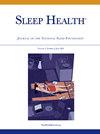Data-driven approach to understand associations between dietary patterns, sleep problems, and mental health in adolescents
IF 3.4
2区 医学
Q2 CLINICAL NEUROLOGY
引用次数: 0
Abstract
Objectives
Emerging evidence suggests a role of diet in sleep disturbances and mental health including internalizing (e.g., anxiety, depression) and externalizing (e.g., aggression, impulsivity) problems.
Methods
This study employed a data-driven approach to construct a Sleep-Mental Health-Eating Index and assessed its mediating roles in the relationships between difficulties initiating and maintaining sleep and mental health problems in 11,000 youth aged 9-10 years. Difficulties initiating and maintaining sleep and mental health problems were assessed annually from baseline to Year2, and diet at Year1. The Shapley Additive Explanations analysis was used to derive the eating index.
Results
Six dietary categories emerged as important predictors of our outcomes, with whole grains, green vegetables, and berries linked to lower difficulties initiating and maintaining sleep scores, while sweet pastries, fast food, and butter cream linked to higher difficulties initiating and maintaining sleep. Dietary factors explained 2.24% of difficulties initiating and maintaining sleep variation, surpassing demographics (1.21%). For internalizing behaviors, dietary and demographic contributions were similar (1.86% vs. 1.98%). Demographics were the strongest predictors of externalizing symptoms (3.84%). Higher baseline difficulties initiating and maintaining sleep (beta = −0.026, 95% CI: −0.038, −0.015) and internalizing scores (beta = −0.027, 95% CI: −0.035, −0.019) were associated with worse eating index at Year1. Additionally, the eating index mediated relationships between baseline difficulties initiating and maintaining sleep/internalizing problems and Year2 outcomes. Overall, indirect effects range from 3.2% to 7.0%.
Conclusions
These findings highlight diet’s role in predicting and mediating sleep and mental health outcomes. Healthy foods were associated with fewer sleep difficulties and internalizing problems, while unhealthy foods worsen sleep and behavior problems. Targeting diet may improve interventions addressing adolescent sleep and mental health challenges.
以数据为导向的方法,了解青少年饮食模式、睡眠问题和心理健康之间的关系。
目的:新出现的证据表明饮食在睡眠障碍和心理健康中的作用,包括内化(如焦虑、抑郁)和外化(如攻击、冲动)问题。方法:采用数据驱动的方法构建睡眠-心理健康-饮食指数,并评估其在11,000名9-10岁青少年启动和维持睡眠困难与心理健康问题之间的中介作用。从基线到第2年,每年评估开始和维持睡眠的困难以及心理健康问题,并在第1年评估饮食。沙普利加性解释分析法用于推导饮食指数。结果:六种饮食类别成为我们研究结果的重要预测因素,其中全谷物、绿色蔬菜和浆果与较低的睡眠开始和维持得分有关,而甜点、快餐和白脱奶油与较高的睡眠开始和维持得分有关。饮食因素解释了2.24%的启动和维持睡眠变化的困难,超过了人口统计学(1.21%)。对于内化行为,饮食和人口统计学的贡献相似(1.86% vs. 1.98%)。人口统计学是外化症状的最强预测因子(3.84%)。较高的开始和维持睡眠的基线困难(β = -0.026, 95% CI: -0.038, -0.015)和内化得分(β = -0.027, 95% CI: -0.035, -0.019)与第一年较差的饮食指数相关。此外,饮食指数介导了开始和维持睡眠/内化问题的基线困难与第二年结果之间的关系。总体而言,间接影响从3.2%到7.0%不等。结论:这些发现强调了饮食在预测和调节睡眠和心理健康结果方面的作用。健康的食物与较少的睡眠困难和内在问题有关,而不健康的食物使睡眠和行为问题恶化。以饮食为目标可能会改善针对青少年睡眠和心理健康挑战的干预措施。
本文章由计算机程序翻译,如有差异,请以英文原文为准。
求助全文
约1分钟内获得全文
求助全文
来源期刊

Sleep Health
CLINICAL NEUROLOGY-
CiteScore
6.30
自引率
9.80%
发文量
114
审稿时长
54 days
期刊介绍:
Sleep Health Journal of the National Sleep Foundation is a multidisciplinary journal that explores sleep''s role in population health and elucidates the social science perspective on sleep and health. Aligned with the National Sleep Foundation''s global authoritative, evidence-based voice for sleep health, the journal serves as the foremost publication for manuscripts that advance the sleep health of all members of society.The scope of the journal extends across diverse sleep-related fields, including anthropology, education, health services research, human development, international health, law, mental health, nursing, nutrition, psychology, public health, public policy, fatigue management, transportation, social work, and sociology. The journal welcomes original research articles, review articles, brief reports, special articles, letters to the editor, editorials, and commentaries.
 求助内容:
求助内容: 应助结果提醒方式:
应助结果提醒方式:


